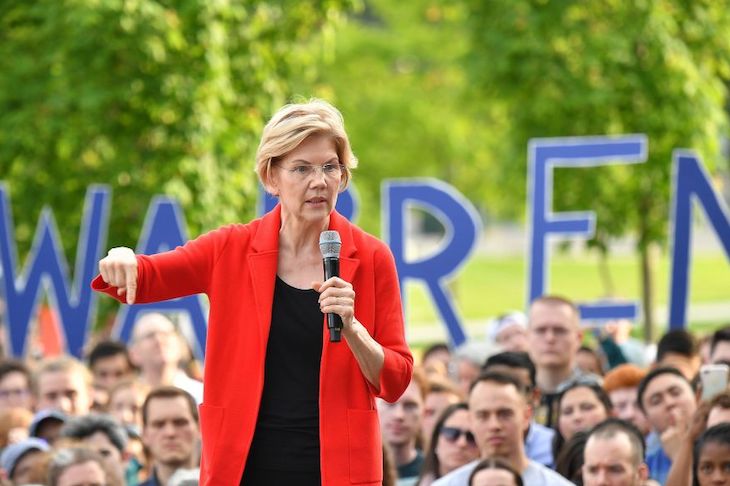In the outlandishly deep and diverse 2020 presidential field, Elizabeth Ann Warren cuts an anonymous figure.
She’s female and running for the White House, but so are Tulsi Gabbard, Amy Klobuchar and Kirsten Gillibrand. She’s a 69-year-old second term senator – not a green first-termer like Kamala Harris, but she’s no Joe Biden. She’s an economic populist, but so is, ostensibly, the president, not to mention her neighbor, Vermont senator Bernie Sanders. The only distinctive moments of her political life in recent months are embarrassments: the much-mocked claim of Native American heritage and a cringe-inducing beer swilling exercise.
Long talked about as a nominee-in-waiting, Warren’s campaign so far has failed to establish any great momentum. Donald Trump famously dissed her as ‘Pocahontas’ and insiders have begun to dismiss her as an also-ran. A former senior official told me ‘she’ll never win’.
With a month to go before the first televised Democratic debate, however, Warren is mounting something of a comeback. It may be time to start taking Warren seriously.
We are approaching the summer of 2019, and the battle to be the left’s standard-bearer is coming into view. There are two main groups: establishment and anti-establishment. Voting preferences on the American Left are more evenly distributed between these two camps than on the right. In 2016, the establishment, in the form of Hillary Rodham Clinton, went up against the anti-establishment, and the establishment won.
Joe Biden is now the powerhouse favorite of the race and éminence grise of the establishment. Bernie Sanders is 2016’s runner-up and the de facto favorite of the anti-establishment. Biden has surprised many pundits by dominating the polls; Bernie Sanders’s start, however, has been sluggish; so far, he’s just not the force he was in 2016. Right now, it’s not really a question of whether Biden will be in the final rounds. Right now, it’s unclear if it’s going to be Sanders.
That’s where Liz Warren comes in.
With Sanders’s failure, she is suddenly a plausible successor as darling of the Left. She has four major advantages.
First, she’s the woman with the plan. Sanders is a stinging critic of the status quo, but it remains unclear whether he’s ready to govern. His CV is heavy on left-wing pamphleting and honeymoons east of the Volga. He’s a socialist, thank you very much, and that’s a winner among my generation, the first in a century failed by capitalism. But Warren cuts the more serious figure for the broader electorate. As a Harvard Law professor, Warren can be establishment and anti-establishment, she’s a renowned bankruptcy expert. She served as inaugural head of Barack Obama’s consumer finance protection agency. Her reform proposals are more tangible than many of the ideas being cooked up on the radical left, less shocking to the American middle classes. Born in Oklahoma, she’s a Dust Bowl New Dealer, not a Trotskyite.
If Warren were the nominee, America’s financial community – like the rest of the US elite, more Democratic than not – would grumble, but not growl. Don’t laugh: finance quietly balked and favored Mitt Romney over Barack Obama in 2012, during the then-president’s re-election bid. But Barack Obama is Barack Obama. For many affluent or aspirational Americans, a nominee Warren would be more attractive than Sanders.
Warren is relatively strong where Sanders was weak. Like evangelicals in the Republican party, black voters in the Democratic party hold a veto on their party’s standard-bearer. Just ask Sanders, who, despite his best efforts, found this constituency to be his achilles’ heel in 2016. The early signs are that Warren is faring far better.
She’s also doing quite well for somebody that is not really being talked about. For all the hype about Pete Buttigieg, she is outperforming him in most states by several points.
Unlike many of her rivals, Warren has a ground game. It’s already making strides in the first caucus state of Iowa, as Barack Obama’s did 10 years ago. Moreover, at a time when women are supposed to be taking over the Democratic party, Warren can quite reasonably argue that she is not one of the male, pale and stale Bs — Biden, Bernie, Buttigieg or Beto.
She was the would-be candidate of 2016. She could be the comeback story of 2020.
At worst, a second wind for Warren’s presidential aspirations could land her a spot on the ticket, quite possibly with Biden, who wanted such an arrangement four years ago, when both of them should have sought this office.


















